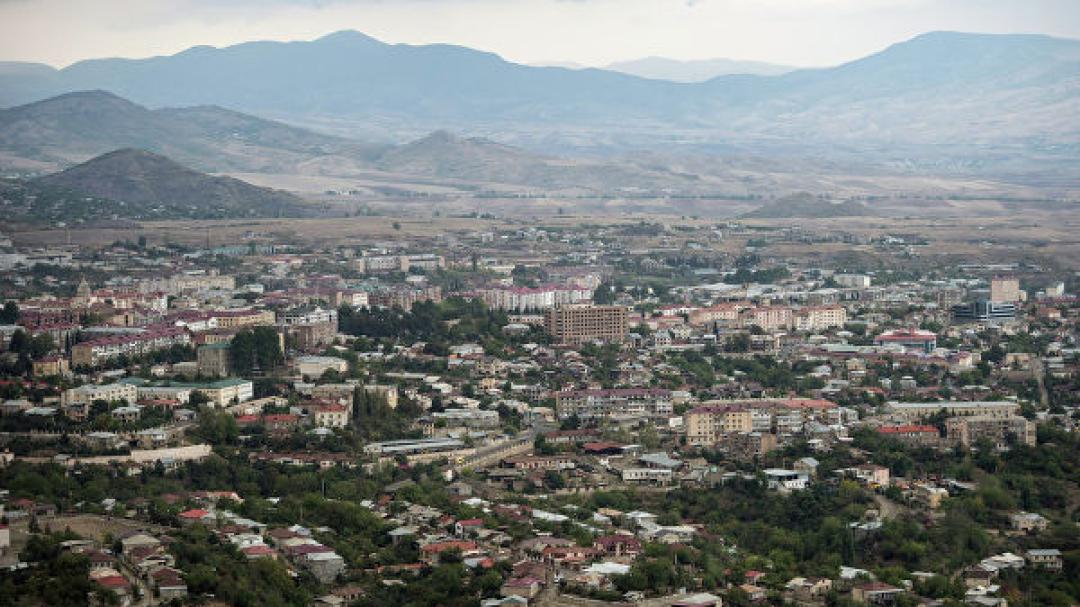
Nagorno-Karabakh: OSCE Minsk group meets with Armenia and Azerbaijan; Sargsyan says that Armenia used Iskender missiles during the war

On 16 February, the OSCE Minsk Group Co-Chairs Igor Popov (Russia), Andrew Schafer (USA) and Stephane Visconti (France) released a statement following a video conference with Armenia’s and Azerbaijan’s Foreign Ministers, Ara Ayvazyan and Jeyhun Bayramov.
The statement stressed that the meetings were conducted separately with the Armenian and Azerbaijani Foreign Ministers and that the Personal Representative of the OSCE Chairperson-in-Office (PRCiO) Andrzej Kasprzyk also participated in the calls. “The co-chairs engaged with each minister in a lengthy and substantive exchange of views on issues related to the promotion of stability in the region, the modalities of the mediation process, and the role of the PRCiO,” the statement emphasised.
The Azerbaijani media reported that during the separate meeting with Bayramov, the parties discussed the current situation in the region, including issues related to the implementation of the trilateral statements from 9 November 2020 and 11 January 2021. The importance of restoring mutual trust for ensuring sustainable peace and security in the region and for the implementation of cohabitation in conditions of calm was noted during the meeting.
On the other side, Armenian media reported that during the meeting with Ayvazyan, the parties exchanged views on the possibilities of resuming the peace process and solving key issues of the Nagorno Karabakh conflict settlement within its framework. Ayvazyan noted that the basis of the conflict is the right of the people of Karabakh to self-determination and security, and the consequences of the use of force cannot be considered as a solution to the conflict. The Armenian Foreign Minister reaffirmed the commitment of the Armenian side to continue efforts for a peaceful settlement under the auspices of the OSCE Minsk Group co-chairs, as the only format with an international mandate to resolve the Nagorno-Karabakh conflict. The parties also exchanged views on resolving humanitarian issues, which are enshrined in the 9 November trilateral statement. Ayvazian especially stressed the need for the immediate release of prisoners of war, hostages and other detained persons, emphasising the unacceptability of Azerbaijan's destructive policy in this matter.
On a humanitarian level, it was reported that Azerbaijan handed over the remains of 106 soldiers to Armenia, bringing the total tally of returned bodies to Armenia to 1,485. It was also reported that Azerbaijan handed over to Armenia one more prisoner of war. Following the reports of shootings in Nagorno-Karabakh (Caucasus Watch reported), the Russian peacekeepers established additional outposts near the Armenian Syunik province. The de facto Foreign Ministry of Nagorno-Karabakh stated that due to security reasons, the entry procedure for foreign citizens into the region’s territory was updated. It was also reported that the region’s de facto parliament introduced the motion to make Russian an official language alongside Armenian.
On a diplomatic level, on 15 February, the spokesperson of Armenia’s Ministry of Foreign Affairs Anna Naghdalyan stated that there was no special provision in the 9 November statement regarding the establishment of the Nakhchivan corridor. “‘Article 9 of the trilateral statement of November 9 reads that “all economic transport links in the region shall be unblocked,’ and Armenia pursues that very approach in regards with the issues of establishing regional stability, as well as the prospects of cooperation in the region. The above-mentioned article does not contain provisions on creating a corridor. Any road or communication route passing through the territory of Armenia will exclusively be under the sovereignty and jurisdiction of Armenia,” she stated.
Naghdalyan’s Azerbaijani counterpart Leyla Abdullayeva responded to this statement by saying that Armenia should take more concrete steps in implementing the trilateral statement. "It would be more useful for the Armenian Foreign Ministry to focus its efforts on taking concrete steps to implement this statement, rather than being engaged with commenting on the paragraphs of the trilateral statement. Currently, it is time to bring peace, well-being, development, and progress to our states and region, in general in deed, but not to issue empty statements verbally,” she emphasised.
The German ambassador to Azerbaijan Wolfgang Manig met with Chairman of the Azerbaijani State Committee for Affairs of Refugees and IDPs Rovshan Rzayev to discuss Germany’s involvement in the restoration of sustainable peace in the South Caucasus region. The diplomat expressed Germany's desire to support the restoration of sustainable peace, relations between communities and ties between civil institutions. It should be noted that a few days earlier, Manig spoke on other areas of Germany’s involvement in Nagorno-Karabakh (Caucasus Watch reported).
In his extensive interview where spoke on the Nagorno-Karabakh negotiations (Caucasus Watch reported), Armenia’s former President Serzh Sargsyan also stated that during the second Karabakh war, Armenia used Iskander Operative Tactical Missile Complex. “I disagree with the statements on non-use of Iskander missiles by the Armenian side. I have exact information that Iskander missile was concretely used at the last stage of the war in the direction of Shusha,” he said. He noted the missiles were sent towards Shusha, after the Azerbaijani forces took control over it. At the same time, Sargsyan acknowledged that rocket and artillery strikes were aimed at the city of Ganja and other settlements far from the frontline of Azerbaijan and that the civilian population was targeted.
See Also


Armenia Records 5.9% GDP Growth in 2024, Missing 7% Goal

Yerevan Balances Strategic Ties with Both US and Russia, Says Foreign Minister

FM Mirzoyan: Peace Deal with Azerbaijan Is Within Reach

Pashinyan and Erdogan Hold Call, Reaffirm Commitment to Ongoing Dialogue

